
Francesca Bessey
As the president of USC’s STAND chapter, the student anti-genocide coalition, Francesca Bessey is passionate about fighting against genocide. And she wants other students to be as well.
USC STAND, which is partnering with the Shoah Foundation Institute Student Association (SFISA) and other student groups to host events throughout April for Genocide Awareness Month, is part of a nationwide student organization that aims to contribute to the end of genocide across the world. USC’s chapter is currently focused on the Conflict-Free Campus Initiative, which lobbies college administrations to adhere to practices that discourage the conflict mineral trade in Africa.
In addition to her work with STAND, Bessey, a junior international relations major, has been an intern at the USC Shoah Foundation for the past two years. She said she was so impressed by the Shoah Foundation's work after attending a panel discussion executive director Stephen Smith participated in with Luis Moreno Ocampo, prosecutor for the International Criminal Court, that she emailed Smith asking if she could work at the USC Shoah Foundation.
For one of her projects, Bessey researched sexual violence in the Visual History Archive. What started as a two-page summary turned into a detailed research project, and Bessey presented the beginnings of her findings at USC Shoah Foundation’s international conference in November 2012. Her research is ongoing.
While watching hundreds of testimonies often became overwhelming, Bessey said doing so allowed her to understand the human element of genocide.
“Every single one of these people experienced a personal tragedy, which in and of itself is horrible, and then multiplied over, you really feel the impact of what you’re looking at,” Bessey said.
Bessey said she learned from the testimonies’ common themes. Many survivors encourage viewers to not simply feel sorry for them, but to take action to ensure a genocide like the Holocaust never happens again.
“The Shoah Foundation was the place where I saw the necessity and the ways that narratives work in inspiring people to action,” Bessey said.
It can be difficult to motivate college students to care about genocide and human rights, but Bessey said students in all disciplines, not just international relations, can make a difference. It’s their responsibility to start making decisions that will have a positive impact.
“We don’t live in an insular world at all. Things that are happening across the globe as important as things happening within our borders,” she said. “[USC] is a community of people who are going to be decision makers not too long from now.”
Bessey is also adamant that having an impact on world issues is not just for activists; anyone can get involved.
“There’s so many issues that happen in this world just because we think that we can’t do anything,” Bessey said. “But I think we can.”